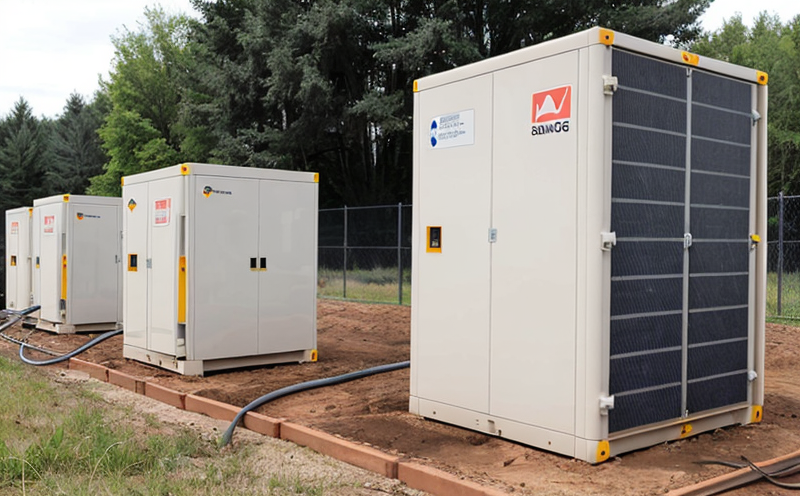
-
Renewable Energy Testing and Standards-
Certification for Energy Efficiency and Storage-
Standards for Energy Storage System Safety
We provide comprehensive solutions designed to help our clients mitigate risks, enhance performance, and excel in key areas such as quality, health & safety, environmental sustainability, and social responsibility.
Discover
For many years, our organization has been operating successfully, boasting modern laboratories that meet international standards. These laboratories are equipped with the latest technology devices and equipment, and we have built a strong team of experienced and trained personnel to operate them.
DiscoverWelcome to Eurolab, your partner in pioneering solutions that encompass every facet of life. We are committed to delivering comprehensive Assurance, Testing, Inspection, and Certification services, empowering our global clientele with the ultimate confidence in their products and processes.
Discover
-
Renewable Energy Testing and Standards-
Certification for Energy Efficiency and Storage-
Standards for Energy Storage System SafetyStandards for Energy Storage System Safety
The increasing adoption of renewable energy sources and the growth of the electric vehicle market have led to a significant rise in demand for energy storage systems (ESSs). ESSs play a crucial role in stabilizing the grid, providing backup power during outages, and enabling efficient use of renewable energy. However, with great benefits come great risks, and safety is a top concern when it comes to ESSs. In this article, we will discuss the standards for ESS safety, highlighting key guidelines, best practices, and technologies that ensure safe operation.
Overview of Energy Storage System Safety Standards
ESS safety standards are critical to prevent accidents, injuries, and property damage caused by electrical shock, fire, or explosion. These standards cover various aspects, including design, installation, testing, and maintenance. Some of the key standards for ESS safety include:
Battery Fire Risk Prevention:
Prevent accidents and injuries caused by electrical shock, fire, or explosion.
Reduce property damage and minimize downtime.
Improve system efficiency and performance.
2. How can I ensure proper thermal management for my ESS?
Use cooling systems designed specifically for ESS applications.
Implement effective heat sinks or insulation to reduce heat buildup.
Monitor temperature levels and implement alarms for abnormal temperatures.
3. What are the key differences between IEEE 1547, UL 9540, and IEC 62619?
IEEE 1547 focuses on ESSs interacting with the grid.
UL 9540 provides testing and certification requirements.
IEC 62619 offers guidelines for safe operation and risk minimization.
4. How can I identify a suitable battery for my ESS application?
Look for batteries designed specifically for ESS applications.
Check the batterys safety ratings and certifications (e.g., UL, CE).
Evaluate the batterys lifespan, capacity, and performance under various conditions.
Implementing these standards and guidelines will ensure safe operation of your ESS.

Environmental Impact Assessment
Environmental Impact Assessment: A Comprehensive Guide Environmental Impact Assessment (EIA) is a c...

Fire Safety and Prevention Standards
Fire Safety and Prevention Standards: Protecting Lives and Property Fire safety and prevention stan...

Industrial Equipment Certification
Industrial equipment certification is a critical process that ensures industrial equipment meets spe...

Pharmaceutical Compliance
Pharmaceutical compliance refers to the adherence of pharmaceutical companies and organizations to l...

Product and Retail Standards
Product and Retail Standards: Ensuring Quality and Safety for Consumers In todays competitive marke...

Environmental Simulation Testing
Environmental Simulation Testing: A Comprehensive Guide In todays world, where technology is rapidl...

Chemical Safety and Certification
Chemical safety and certification are critical in ensuring the safe management of products and proce...

Trade and Government Regulations
Trade and government regulations play a vital role in shaping the global economy. These regulations ...

Electrical and Electromagnetic Testing
Electrical and Electromagnetic Testing: A Comprehensive Guide Introduction Electrical and electrom...

Battery Testing and Safety
Battery Testing and Safety: A Comprehensive Guide As technology continues to advance, battery-power...

Railway Industry Compliance
Railway Industry Compliance: Ensuring Safety and Efficiency The railway industry is a critical comp...

Consumer Product Safety
Consumer Product Safety: Protecting Consumers from Harmful Products As a consumer, you have the rig...

Hospitality and Tourism Certification
Hospitality and Tourism Certification: Unlocking Opportunities in the Industry The hospitality and ...

Pressure Vessels and Installations Testing
Pressure Vessels and Installations Testing Pressure vessels are a critical component of various ind...

Lighting and Optical Device Testing
Lighting and Optical Device Testing: Ensuring Performance and Safety Lighting and optical devices a...

Renewable Energy Testing and Standards
Renewable Energy Testing and Standards: Ensuring a Sustainable Future The world is rapidly transiti...

Energy and Sustainability Standards
In today’s rapidly evolving world, businesses face increasing pressure to meet global energy a...

Cosmetic Product Testing
The Complex World of Cosmetic Product Testing The cosmetics industry is a multi-billion-dollar ma...

Aviation and Aerospace Testing
Aviation and Aerospace Testing: Ensuring Safety and Efficiency The aviation and aerospace industr...

Construction and Engineering Compliance
Construction and Engineering Compliance: Ensuring Safety, Quality, and Regulatory Adherence In the ...

Food Safety and Testing
Food Safety and Testing: Ensuring the Quality of Our Food As consumers, we expect our food to be sa...

Automotive Compliance and Certification
Automotive Compliance and Certification: Ensuring Safety and Efficiency The automotive industry is ...

IT and Data Center Certification
IT and Data Center Certification: Understanding the Importance and Benefits The field of Informatio...

NEBS and Telecommunication Standards
Network Equipment Building System (NEBS) and Telecommunication Standards The Network Equipment Bu...

Agricultural Equipment Certification
Agricultural equipment certification is a process that ensures agricultural machinery meets specific...

Electromechanical Safety Certification
Electromechanical Safety Certification: Ensuring Compliance and Protecting Lives In todays intercon...

Healthcare and Medical Devices
The Evolution of Healthcare and Medical Devices: Trends, Innovations, and Challenges The healthcare...

MDR Testing and Compliance
MDR Testing and Compliance: A Comprehensive Guide The Medical Device Regulation (MDR) is a comprehe...

Military Equipment Standards
Military Equipment Standards: Ensuring Effectiveness and Safety The use of military equipment is a ...

Transportation and Logistics Certification
Transportation and Logistics Certification: A Comprehensive Guide The transportation and logistics ...